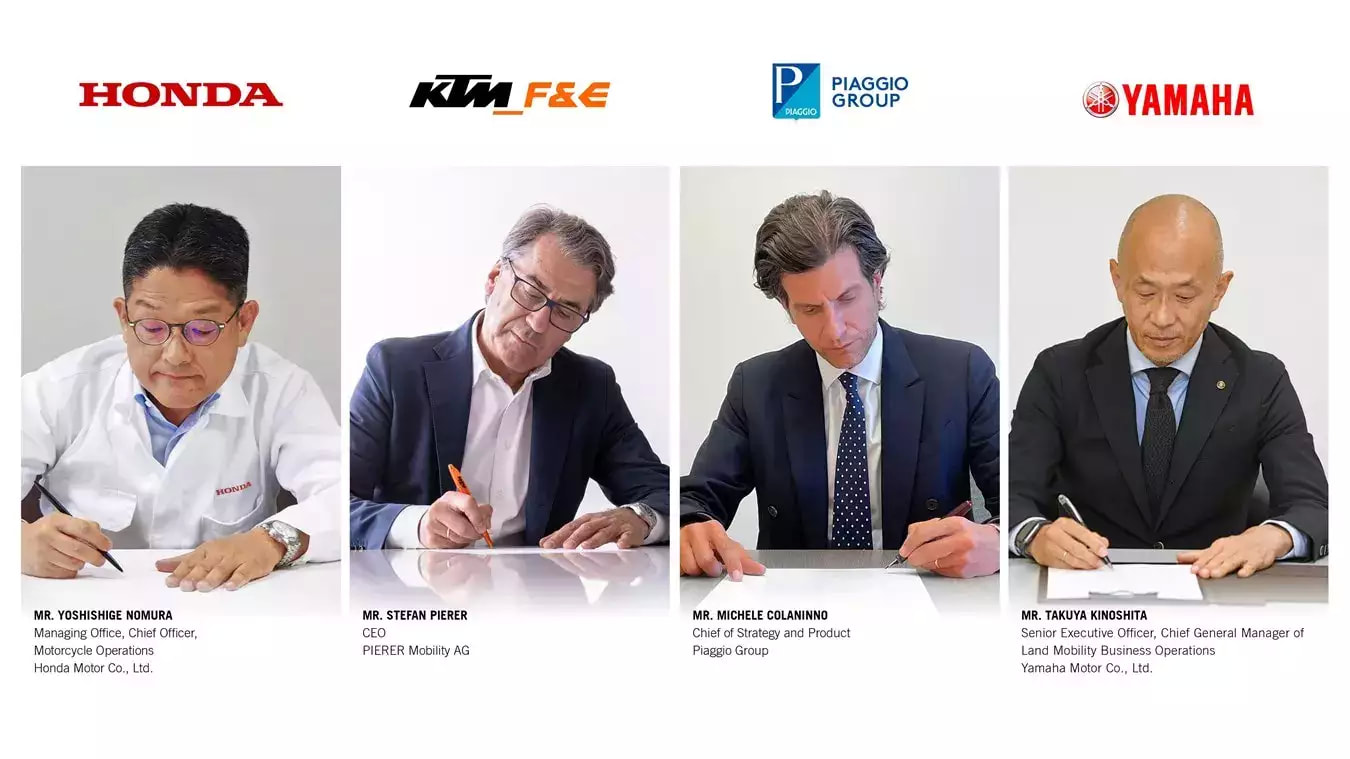Italian scooter maker Piaggio said on Monday it had set up a consortium with Honda Motor Co., KTM AG and Yamaha Motor Co. to encourage the use of swappable batteries for electric motorcycles and light electric vehicles
The Swappable Batteries Motorcycle Consortium (SBMC), the project aims to encourage/boost the use of swappable battery technology and set up common technical specifications to support sustainable management of their batteries. The consortium also aims to promote the increased use of light electric vehicles such as mopeds, motorbikes, scooters, tricycles and quadricycles. It will focus on issues such as battery life, recharging times, infrastructure and costs and will work on defining international standard technical specifications for swappable batteries.
"Urban mobility is going through a delicate transition moment towards electrification. Thanks to this consortium motorbikes will keep their key role," said Piaggio Chief of Strategy and Product, Mr. Michele Colaninno
Honda's Motorcycle Operations Chief Officer Yoshishige Nomura said, "The consortium's objectives aimed to make electric motorbikes more convenient for clients, as their "use on large scale can substantially contribute to the creation of a more sustainable society".
The four founding members of the consortium will also engage with various decision-makers, to help create an International set of technical standards for swappable battery systems and light electric vehicles. It will be a solution to the issues preventing widespread adoption of electric motorcycles as a more environmentally friendly and convenient form of mobility – the drive range and reduction of charging time.
"Urban mobility is going through a delicate transition moment towards electrification. Thanks to this consortium motorbikes will keep their key role," said Piaggio Chief of Strategy and Product, Mr. Michele Colaninno
Honda's Motorcycle Operations Chief Officer Yoshishige Nomura said, "The consortium's objectives aimed to make electric motorbikes more convenient for clients, as their "use on large scale can substantially contribute to the creation of a more sustainable society".
The four founding members of the consortium will also engage with various decision-makers, to help create an International set of technical standards for swappable battery systems and light electric vehicles. It will be a solution to the issues preventing widespread adoption of electric motorcycles as a more environmentally friendly and convenient form of mobility – the drive range and reduction of charging time.
PluginIndia Take
This is a clear indication that MNC big shot scooter giants like Piaggio, Honda will launch electric scooters with batteries that can be swapped out easily. These companies have the resources to setup 20-30 battery swap stations in multiple cities. And with standardization, customer of a Piaggio electric scooter or a Honda electric scooter can visit these swap stations and change batteries which is good for the ecosystem. Standards are critical to the mass adoption of new technology. Lack of standards will result in disputes and slow adoption of technology. We have many examples in the past like DVD & BlueRay. We even see issues in our EV industry, where Tesla has their own charger network, where other vehicles cannot use them. Apparently Rivian is building their own charging infrastructure in the USA. We are seeing the same in India. The OLA Hyper charger network is another closed system, where no other electric scooter brand can use them.
Ultimately we will see standards coming up for charging too. But it is good to see this battery swapping standards being set by these giant MNC corporations.
While, we understand that battery swapping will be the main focus for these companies, but at the same time, they should give an option to charge batteries of two wheelers too. We hope they provide an option for users to charge at home or work. Charging at home or work is very easy, if we hope that option will be provided. If they don't, then we will understand that this entire battery swapping investment will be to ensure they remain in control, which is exactly EV owners don't want. Time will tell.
This is a clear indication that MNC big shot scooter giants like Piaggio, Honda will launch electric scooters with batteries that can be swapped out easily. These companies have the resources to setup 20-30 battery swap stations in multiple cities. And with standardization, customer of a Piaggio electric scooter or a Honda electric scooter can visit these swap stations and change batteries which is good for the ecosystem. Standards are critical to the mass adoption of new technology. Lack of standards will result in disputes and slow adoption of technology. We have many examples in the past like DVD & BlueRay. We even see issues in our EV industry, where Tesla has their own charger network, where other vehicles cannot use them. Apparently Rivian is building their own charging infrastructure in the USA. We are seeing the same in India. The OLA Hyper charger network is another closed system, where no other electric scooter brand can use them.
Ultimately we will see standards coming up for charging too. But it is good to see this battery swapping standards being set by these giant MNC corporations.
While, we understand that battery swapping will be the main focus for these companies, but at the same time, they should give an option to charge batteries of two wheelers too. We hope they provide an option for users to charge at home or work. Charging at home or work is very easy, if we hope that option will be provided. If they don't, then we will understand that this entire battery swapping investment will be to ensure they remain in control, which is exactly EV owners don't want. Time will tell.
Subscribe to PluginIndia on YouTube to follow the Indian EV Industry and EV Community. Also subscribe to our podcast.

